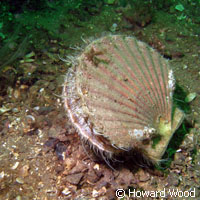Positive results from Scotland's first marine reserve
In the United Kingdom, Scotland's first fully protected marine reserve is already home to several species of algae known to promote biodiversity as well as commercially valuable scallops, according to new European research. Set up off the Isle of Arran in 2008, the marine reserve came to fruition following years of campaigning from the Community of Arran Seabed Trust (COAST) to ban fishing and other extractive activities: the aim was to protect a small area of seabed in the Isle of Arran's Lamlash Bay, in order to enable natural ecosystems to rebuild themselves and flourish. A study from researchers at the University of York and COAST shows that the reserve is already showing positive signs for both fishermen and conservationists alike. The results, published in the journal Marine Biology, show that commercially valuable scallops and several species of algae known to promote biodiversity are much more abundant within the marine reserve where fishing is banned, compared to the surrounding waters. Leigh Howarth, lead author of the study, said: 'Marine ecosystems can continue to recover for decades when protected inside reserves; the reason this study is so exciting is because this is just the beginning.' A key finding from the marine reserve research is that the abundance of juvenile scallops was much higher in the reserve than outside. This was linked to the high levels of kelp and maerl (a type of algae that forms coral-like beds) inside the reserve where adult scallops were also larger and older. As stocks of scallops build up in marine reserves, they can start to breed at high levels, helping to seed surrounding fishing grounds. Dr Bryce Beukers-Stewart, another researcher on the project, said: 'It is brilliant that our results have provided a win-win scenario. Marine reserves like this can benefit both fishermen and conservationists.' Although scallops are not widely consumed in the United Kingdom, they remain the third most valuable type of seafood for the economy, with a value of almost GBP 50 million in 2009. Yet, despite their value to the economy, scallops have long been a sore point for environment groups; dredging for scallops can damage seabed habitats. The Isle of Arran marine reserve, like the many other marine reserves being developed elsewhere in Europe and around the world, can bring huge benefits, and now this study provides the evidence to back up the claims. Although the marine reserve off the Isle of Arran is small, its success has huge implications. Both the United Kingdom and Scottish governments have recently passed Marine Acts, which means networks of marine protected areas around the United Kingdom coastline will be set up, many of which will be fully protected marine reserves like the one off Arran. Dr Beukers-Stewart added: 'Despite some scepticism in the UK fishing industry about marine reserves due to their being largely untested in our waters, the work at Arran provides some very positive and timely evidence about their potential.' COAST chair Howard Wood also expressed the need for governments to take findings like these on board: 'The University of York's partnership with COAST is a highly progressive collaboration, because it provides meaningful research for a vital policy area. But without political will for genuinely changing the management of our seas it doesn't matter how many scientific papers are published. We hope the Scottish Government will take this study seriously.'For more information, please visit: University of York: http://www.york.ac.uk/
Countries
United Kingdom



